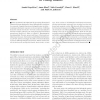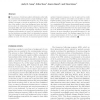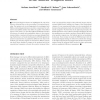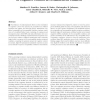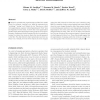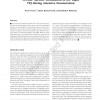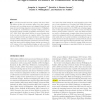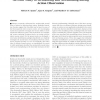129
click to vote
JOCN
2011
14 years 5 months ago
2011
■ Humans are constantly confronted with environmental stimuli that conflict with task goals and can interfere with successful behavior. Prevailing theories propose the existence...
JOCN
2011
14 years 5 months ago
2011
111
click to vote
JOCN
2011
14 years 5 months ago
2011
■ The presence of irrelevant auditory information (other talkers, environmental noises) presents a major challenge to listening to speech. The fundamental frequency (F0) of the ...
JOCN
2011
14 years 5 months ago
2011
■ Neuropsychological evidence has highlighted the role of the anterior temporal lobes in the processing of conceptual knowledge. That putative role is only beginning to be inves...
JOCN
2011
2011
Cardiorespiratory Fitness and the Flexible Modulation of Cognitive Control in Preadolescent Children
14 years 5 months ago
■ The influence of cardiorespiratory fitness on the modulation of cognitive control was assessed in preadolescent children separated into higher- and lower-fit groups. Participa...
131
click to vote
JOCN
2011
14 years 5 months ago
2011
■ Previous studies suggested that the observation of other individualsʼ somatosensory experiences also activates brain circuits processing oneʼs own somatosensory experiences....
124
click to vote
JOCN
2011
14 years 5 months ago
2011
■ Observers spontaneously segment larger activities into smaller events. For example, “washing a car” might be segmented into “scrubbing,” “rinsing,” and “drying�...
116
click to vote
JOCN
2011
14 years 5 months ago
2011
■ Several recent behavioral studies have shown that the enumeration of a small number of items (a process termed subitizing) depends on the availability of attentional resources...
JOCN
2011
14 years 5 months ago
2011
115
click to vote
JOCN
2011
14 years 5 months ago
2011
■ Humans commonly understand the unobservable mental states of others by observing their actions. Embodied simulation theories suggest that this ability may be based in areas of...

